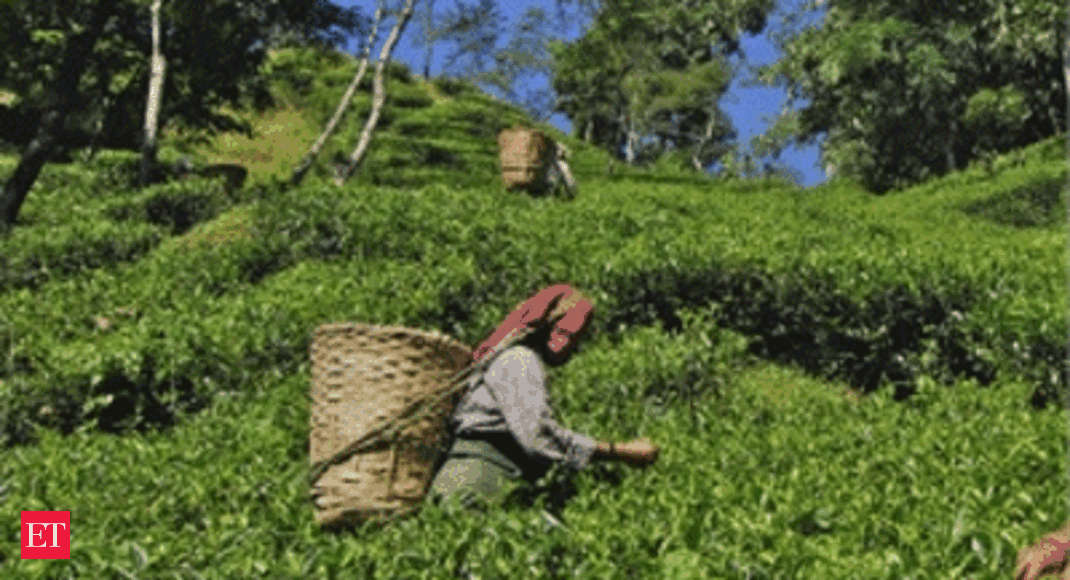Darjeeling Tea Production: Growing Concerns

Table of Contents
The Impact of Climate Change on Darjeeling Tea Production
The delicate ecosystem of the Darjeeling tea gardens is highly susceptible to the vagaries of climate change. The region's unique microclimate, crucial for producing high-quality tea, is undergoing significant shifts.
Erratic Rainfall Patterns
Unpredictable monsoons pose a considerable threat to Darjeeling tea production. The timing and intensity of rainfall are crucial for the growth and development of tea bushes.
- Reduced yields: Inconsistent rainfall leads to stunted growth and reduced yields, directly impacting the quantity of tea produced.
- Increased pest infestations: Erratic rainfall creates ideal conditions for the proliferation of pests and diseases, damaging the tea bushes and reducing the quality of the harvest.
- Difficulty in predicting harvest times: The unpredictable nature of rainfall makes it challenging to accurately predict harvest times, disrupting the entire production process.
Inconsistent rainfall directly affects the quality and quantity of Darjeeling tea leaves. A lack of sufficient moisture during crucial growth stages can lead to smaller, less flavorful leaves, while excessive rainfall can cause waterlogging and fungal diseases.
Rising Temperatures
Rising temperatures are another significant concern. The ideal temperature range for Darjeeling tea production is relatively narrow, and even small increases can negatively impact the quality and characteristics of the tea.
- Faster oxidation: Higher temperatures accelerate the oxidation process, leading to a harsher, less nuanced flavor profile.
- Altered flavor profiles: The delicate muscatel flavor, a hallmark of Darjeeling tea, is particularly vulnerable to temperature changes, resulting in a less desirable taste.
- Reduced antioxidant properties: Studies suggest that higher temperatures can reduce the antioxidant properties of Darjeeling tea, diminishing its health benefits.
Scientific evidence strongly links increased temperatures to significant alterations in tea composition, affecting both its taste and its beneficial properties.
Increased Pest and Disease Incidence
Changing climate conditions are increasing the incidence of pests and diseases affecting Darjeeling tea plants.
- Spread of new pests: Warmer temperatures and altered rainfall patterns create favorable conditions for the spread of new pests into the region.
- Increased susceptibility to existing diseases: Stressed plants, weakened by climate change impacts, become more susceptible to existing diseases.
- Higher pesticide usage: The increased incidence of pests and diseases necessitates higher pesticide usage, raising significant environmental concerns.
The increased use of pesticides has detrimental consequences for the environment, potentially harming beneficial insects and impacting the overall health of the ecosystem. Finding sustainable pest control methods is crucial for the future of Darjeeling tea production.
Socio-Economic Challenges in Darjeeling Tea Gardens
Beyond the environmental pressures, Darjeeling tea production faces significant socio-economic challenges that threaten its viability.
Labor Shortages and Migration
Attracting and retaining a skilled workforce is a major concern for Darjeeling tea gardens.
- Young people leaving for better opportunities: Limited opportunities and low wages drive young people to seek employment in urban areas, leading to a shrinking workforce.
- Aging workforce: The existing workforce is aging, leading to a skills gap and impacting productivity.
- Lack of skilled labor: The lack of skilled labor hinders the adoption of modern techniques and efficient production methods.
This migration is driven by a combination of social and economic factors, including limited access to education, healthcare, and better employment opportunities outside the tea gardens.
Fair Wages and Worker Welfare
Fair wages and improved working conditions are essential for attracting and retaining workers and ensuring ethical production.
- Low wages: Many tea workers receive wages that are insufficient to meet their basic needs.
- Poor living conditions: Housing and sanitation conditions in many tea gardens remain inadequate.
- Lack of healthcare benefits: Access to quality healthcare is often limited for tea workers.
- Worker exploitation: Instances of worker exploitation continue to occur in some tea gardens.
Addressing these issues is crucial not only for ethical considerations but also for the long-term sustainability of Darjeeling tea production. Fair wages and improved worker welfare are essential for attracting and retaining a skilled workforce.
Competition from Other Tea-Producing Regions
Darjeeling tea faces increasing competition from other tea-producing regions globally.
- Cheaper tea from other regions: Lower production costs in other regions allow for significantly cheaper tea, putting pressure on Darjeeling tea's market share.
- Price pressure on Darjeeling tea: The competition forces down prices, reducing the profitability of Darjeeling tea farmers and producers.
- Struggle to maintain market share: Maintaining a competitive market share requires strategic adaptations and a focus on the unique qualities of Darjeeling tea.
The global competition necessitates a strategy focused on highlighting the superior quality and unique characteristics of Darjeeling tea to justify the higher price point.
Sustainability and the Future of Darjeeling Tea Production
The future of Darjeeling tea production hinges on the adoption of sustainable practices and supportive policies.
Sustainable Farming Practices
Transitioning to organic and sustainable farming methods is crucial for mitigating the impacts of climate change and improving the long-term health of the ecosystem.
- Reduced pesticide use: Reducing pesticide use minimizes environmental damage and improves the overall health of the tea bushes.
- Water conservation: Implementing water conservation techniques is essential given the impact of climate change on rainfall patterns.
- Soil health improvement: Improving soil health through sustainable practices enhances the resilience of tea plants and improves the quality of the tea.
Several successful examples of sustainable farming practices in Darjeeling tea gardens demonstrate the feasibility and benefits of this approach.
Government Support and Policies
Government support is crucial for fostering the sustainability and competitiveness of Darjeeling tea production.
- Financial aid: Financial aid can assist tea farmers in adopting sustainable practices and modernizing their operations.
- Research and development initiatives: Investing in research and development helps to address the challenges posed by climate change and pests.
- Marketing support: Government support in marketing Darjeeling tea can enhance its brand image and market share.
- Fair trade policies: Implementing fair trade policies ensures fair prices for farmers and improved working conditions.
The effectiveness of existing policies needs to be reviewed and potential improvements implemented to better support the industry.
Protecting the Darjeeling Tea Brand
Protecting the Darjeeling brand identity and ensuring its quality is paramount.
- Implementing stricter quality control measures: Stricter quality control measures will ensure that only high-quality tea is marketed under the Darjeeling brand.
- Combating counterfeiting: Combating counterfeiting is essential to protect the reputation and value of Darjeeling tea.
- Promoting geographical indication (GI) protection: Strengthening GI protection for Darjeeling tea safeguards its uniqueness and prevents misuse of the brand name.
Protecting the Darjeeling brand in the international market is crucial for maintaining its premium status and ensuring the economic viability of the industry.
Conclusion
The future of Darjeeling tea production faces considerable challenges, but proactive measures can ensure its survival and prosperity. By addressing climate change impacts, improving socio-economic conditions, adopting sustainable farming methods, securing government support, and robustly protecting the Darjeeling brand, we can secure the future of this iconic beverage. Let's work together to protect the future of Darjeeling tea production and ensure that this exquisite tea continues to be enjoyed for generations to come. Learn more about supporting sustainable Darjeeling tea farms and initiatives today!

Featured Posts
-
 Immigration Starmers Strategy To Counter Farages Populist Appeal
May 04, 2025
Immigration Starmers Strategy To Counter Farages Populist Appeal
May 04, 2025 -
 Sheung Wans Honjo A Japanese Restaurant Review
May 04, 2025
Sheung Wans Honjo A Japanese Restaurant Review
May 04, 2025 -
 Oscars 2025 Fashion Emma Stones Stunning Sequin Louis Vuitton Creation
May 04, 2025
Oscars 2025 Fashion Emma Stones Stunning Sequin Louis Vuitton Creation
May 04, 2025 -
 Emma Stones Oscars 2025 Look A Bold Sequin Louis Vuitton Dress And Classic Hairstyle
May 04, 2025
Emma Stones Oscars 2025 Look A Bold Sequin Louis Vuitton Dress And Classic Hairstyle
May 04, 2025 -
 Chinas Electric Vehicle Rise Is The Us Prepared To Compete
May 04, 2025
Chinas Electric Vehicle Rise Is The Us Prepared To Compete
May 04, 2025
